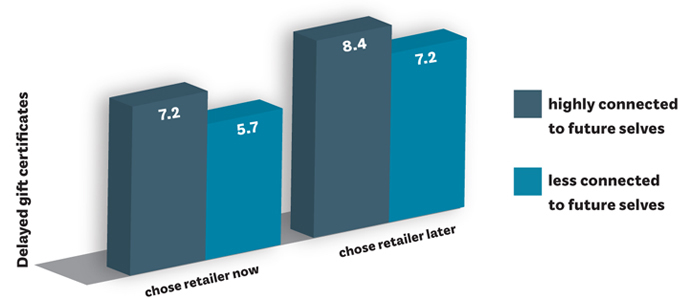The decisions consumers make depend partly on who they think they'll be in the future, says Chicago Booth marketing professor Oleg Urminsky. Those who believe they'll change significantly—and feel only distantly connected to their "future selves"—are more likely to make short-term choices. In a study in the June Journal of Consumer Research, Urminsky and Columbia University collaborator Daniel Bartels divided 18- to 29-year-old participants into two groups: one told that their young adulthoods would see big changes, the second that their identities were mostly set. Some participants had to select a retailer for a gift certificate (fixed) right away, while others could choose later (flexible). To assess how connectedness affected the subjects' decisions, researchers then had them pick between a lesser-value certificate immediately or wait a year for one worth more. Those who'd been told their current self wouldn't change showed more patience to wait for a larger reward, as shown above. The trend held whether the retailer choice was fixed or flexible.

May 31–June 3, 2012
- 31
- 32
- 33
- 34
- 35
- 36
- 37
- 38
- 39
- 40
- 41
- 42
- 43
- 44
- 45
- 46
- 47
- 48
- 49
- 50
- 51
- 52
- 53
- 54
- 55
- 56
- 57
- 58
- 59
- 60
- 61
- 62
- 63
- 64
- 65
- 66
- 67
- 68
- 69
- 70
- 71
- 72
- 73
- 74
- 75
- 76
- 77
- 78
- 79
- 80
- 81
- 82
- 83
- 84
- 85
- 86
- 87
- 88
- 89
- 90
- 91
- 92
- 93
- 94
- 95
- 96
- 97
- 98
- 99
- 00
- 01
- 02
- 03
- 04
- 05
- 06
- 07
- 08
- 09
- 10
- 11
submit your class news
What's new? We are eager to receive your news. Items may be edited for space. No engagements, please.









